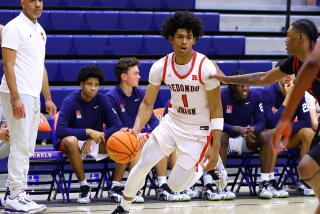NCAA BASKETBALL TOURNAMENT : WEST REGIONAL : UNLV Escapes Ball State, 69-67, Will Play Loyola Next
- Share via
OAKLAND — That comfortable lead Nevada Las Vegas had from the start Friday night turned suddenly, excruciatingly uncomfortable for the Rebels with less than two minutes remaining.
That was when Ball State’s Billy Butts went up for a three-point shot and made it, cutting UNLV’s lead to three points. A little more than 30 seconds earlier, Ball State’s Chandler Thompson had made a three-point basket. Together, they cut a nine-point UNLV lead into three, and together they put second-ranked UNLV a big play or two from going home.
UNLV held on for a 69-67 victory in front of 14,262 at the Oakland Coliseum Arena in a West Regional semifinal only after UNLV center David Butler intercepted a weak lob pass in the middle of the lane from Mike Spicer in the final seconds, preventing the Cardinals from getting off a shot.
The victory sends UNLV into the final eight for the second year in a row and the third time in four years. The Rebels will play Loyola Marymount Sunday for the West Regional championship and a trip to the Final Four.
UNLV defeated Loyola, 102-91, when the teams met early this season.
UNLV (32-5) gave the Cardinals plenty of opportunities to replace the Rebels as the team in Sunday’s final, missing three of four free throws down the stretch. Greg Anthony missed the front end of a one-and-one opportunity twice in the final 34 seconds, including one with 18 seconds to play, giving Ball State a chance to tie the score or win.
“We looked like we had a pretty good lead there, like we had things pretty much under control,” UNLV Coach Jerry Tarkanian said. “But it was a game we could conceivably have given away at the end.”
UNLV led by 11 points midway through the second half, but as it did all game, Ball State came back. There was no bigger reason for that than the Cardinals’ rebounding. Despite being a smaller team, Ball State outrebounded UNLV, 51-36.
“They got some second shots,” Tarkanian said.
Larry Johnson and Stacey Augmon led UNLV with 20 points each. Chandler Thompson scored 21 for Ball State, and Paris McCurdy added 17.
Ball State (26-7) ended its run after beating Oregon State and Louisville in dramatic games. Of three NCAA tournament games the Cardinals played, none was settled until the final minute. One, the Oregon State game, wasn’t settled until time had expired, when Paris McCurdy made a free throw to complete a three-point play.
They came close, too close for UNLV’s comfort, to winning a third.
“It’s a tribute to the heart these kids play with,” Ball State Coach Dick Hunsaker said.
Until last week, Ball State had beaten only one team ranked in the top 25 in its history. That was in a 1974 victory over Cincinnati, then ranked 20th. After the first and second round of the tournament last week, that total had tripled with victories over 22nd-ranked Oregon State and 16th-ranked Louisville.
Their two victories marked the first time a Mid-American Conference school had won two NCAA games since 1964, when Ohio University beat Louisville and Kentucky before losing to Michigan.
UNLV took a 17-6 lead, but Ball State cut it to three. By halftime, UNLV led 41-33, despite shooting only 42%. One of the reasons UNLV still led was that Ball State made only 10 of 35 shots, or 29%.
Ball State’s Curtis Kidd had thought playing against UNLV’s inside players might be easier than playing against Felton Spencer, Louisville’s 7-foot center. He found out differently.
Kidd was guarding Larry Johnson in the first half. After 20 minutes, Johnson had 16 points and 10 rebounds.
In all, 32 of UNLV’s 41 first-half points came from inside players, although not all of them came from inside--Johnson got three of his points on one shot, a 20-foot jumper.
But even though the Rebels had little trouble getting the ball inside, they missed 10 shots in the lane in the first half.
It was not the blowout predicted by many.
“Some people told me today it would be a blowout,” Augmon said. “I told them they were wrong.”
More to Read
Go beyond the scoreboard
Get the latest on L.A.'s teams in the daily Sports Report newsletter.
You may occasionally receive promotional content from the Los Angeles Times.










